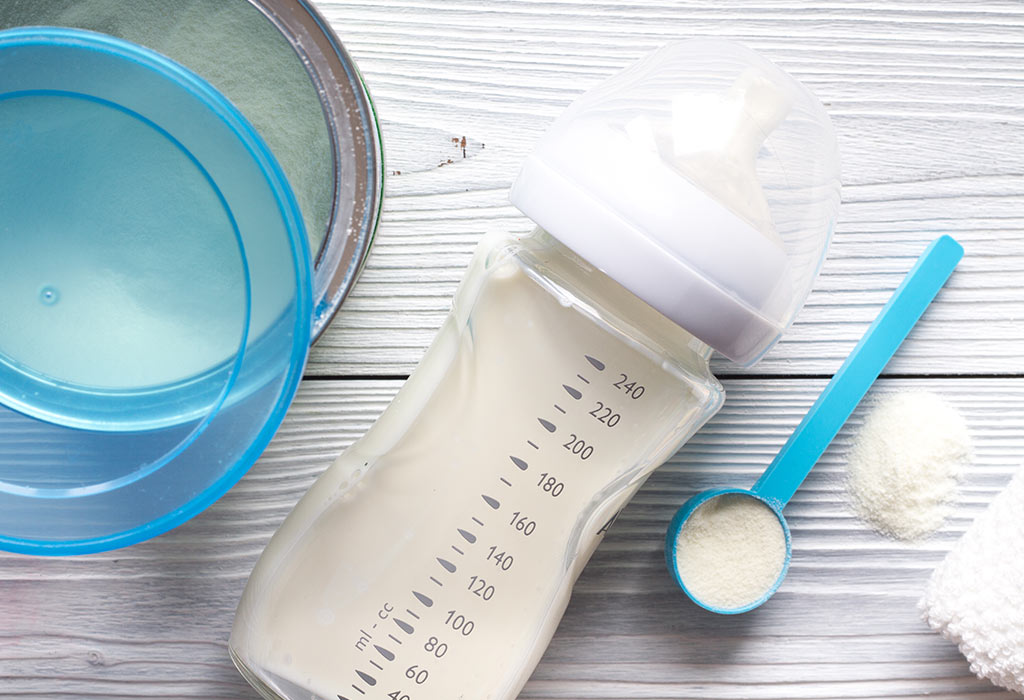It’s quite well known that when it comes to baby feeding, breastfeeding is the most suitable option for newborns. “Breast is best” is a common saying; other than being extremely inexpensive, breastfeeding offers a whole lot of health benefits to both the baby and mother.
But let’s discuss facts here — if you have a baby who still wakes up very frequently at night, the benefits of breastfeeding are probably the last thing you’re thinking about in these middle-of-the-night feedings.
How you choose to feed your baby is your own decision. Although mothers are advocated to breastfeed, by their healthcare professionals, family members, friends, and pretty much every single parenting book written in the last 15 years, the case differs from babies to babies.
While breastfeeding works just fine, Formula Feeding or Supplementing with Formula is what’s best in some cases.
Even if bottle feedings aren’t as swift and comfortable as breastfeeding, formula feeding at night and breastfeeding during the day allows you to be in a position where you can get more sleep and rest.
This guide right here would help you understand how formula feeding at night works, and tips to go through this phase of your life conveniently.
Introducing formula to a breastfed baby at night.

Make sure you wait until your breast milk is established before you start supplementing with formula. Your baby must be one-month-old when you start formula feeding at night to prevent any kind of confusion as the sucking actions required are different during bottle-feeding & breastfeeding.
Now follow these steps thoroughly if you want to establish formula feeding at night successfully. Each step is important to introduce formula to a breastfed baby:
Step 1: Purchase a formula based on cow’s milk that contains DHA and iron. If your infant has a milk allergy or sensitivity, it may require a formula made of soy. Ask your healthcare professional if you’re unsure which formula to go for.
Step 2: Prepare the formula bottle now by following the label on the package. These bottles would stay fresh for up to 24 hours in refrigerator.
Step 3: It’d be better if your partner or any of your family members feed the baby at night using formula. Reduce the plausibility of your infant wanting you to give her a bottle instead of your breast during the day by letting her believe that mom only provides milk while others provide formula.
Step 4: Now, offer formula bottle to your baby instead of your breast at night. If your baby typically eats at night several times, replace one of the feedings at a time and gradually work for having all the night-time feedings from the formula.
A Few Tips:
- Express your milk at night. Although if you’re thinking of reducing your milk production at night, express just enough to save you from feeling engorged or uneasy.
- Use a breast pump if you want your body to keep producing milk and then save the milk you collect for day time use.
- Most babies who are breast fed need a vitamin D supplement of 400 IU every day. Although if your baby gets at least 32 oz. of formula in a 24-hour period, it no longer requires a vitamin D suppement.
If your infant develops diarrhea, scaly or red skin, vomiting, extensive fatigue, or weakness after consuming the formula, call your healthcare professional. This might be a sign of an allergy to the formula.
The Three Types of Formula you can Feed your Baby.

Before we move forward to our best tips for nighttime formula feeding, it’s crucial to understand the various types of formula you can use for your little one.
Powdered Formula: This is by far the most commonly used formula because of how inexpensive it is. Additionally, it’s easy to use, store, and transport.
All you need to do to make the formula is – mix the proper ratio of formula to water as instructed on the package.
Concentrated Liquid Formula: Just like the powdered formula, concentrated liquid formula must be mixed to water in proper ratio before giving it to the baby. The only difference between the two is that this formula is a bit expensive, but less messy.
Ready-to-Feed Formula: You might have already guessed how this formula is. It’s exactly like it sounds. There is no mixing to be done with water, but instead can be poured right into the bottle for the baby. Because of how convenient this formula type is, it’s also by far the most expensive one.
No matter what type you choose, you must be confident that you’re giving your baby the peculiar nutrition to flourish & grow.
The Food and Drug Administration (FDA) oversees the formula manufacturers to ensure that their products are “safe and support healthy growth in infants who consume them.” The FDA would never allow a product to be sold that would harm children.
Today’s formula is as close as ever to reforming breast milk, which is really comforting for parents who choose formula feeding as an option. It is also supportive for women who have been considering supplementing with formula overnight, yet feel guilty about it.
Tips for Making Formula Feeding Easier at Night.

There’s nothing more difficult than being woken up from a dead sleep by a hungry baby. But if you follow certain rules and routines, the process becomes easier and goes a lot more quicly.
Here are our most valuable tips for you to feeding formula at night so you can get back to sleep as quickly as you woke up.
1. Prepare Formula Ahead of Time
This honestly is the most obvious tip anyone can give anyone about anything. If you are looking forward to easy 1bformula feeds, you’ll want to have everything ready before you go to sleep.
This way you wouldn’t have to worry about heading to the kitchen every time your baby wakes you up in the middle of the night. Follow this tip especially in the first several weeks when you’ll have to be up multiple times every night.
Follow safe storage guidelines as you wouldn’t be feeding the formula to your baby right away:
- Mix formula bottles before you go to sleep and store them in a cooler bag or refrigerator.
- Another way to this is – keep the formula and water separate in exact measurements until it’s time to feed. Have your baby’s bottle filled with the correct number of ounces of room temp water.
2. Keep A Calm Environment
The room environment must stay as calm as possible for formula feeding at night. You don’t want your baby getting the wrong idea that 3 am means it’s time to rock and roll.
- Keep the room dimly lit: You just need to be able to see what you’re doing.
- Do NOT make unnecessary noise: If you keep everything ready as suggested in the above tip, there is very little chance of you making any noise at all.
- Cuddles & Gentle kisses: You have all the time in the day to talk and interact with your baby. Keep it to the lowest at night.
As a goal, you want your baby to understand that the night time is for sleeping & sleeping only. Keeping the room dark and quiet will make the way back to sleeping much more smoother.
3. Share your Room
Not only will having your baby sleep in your room make formula feeding at night a lot more easy and quick, but the American Academy of Pediatrics suggests room-sharing (no co-sleeping) for the first 6 months.
This can minimize the risk of SIDS by up to 50%.
To be more beneficial in sharing rooms, we recommend having your baby in a crib or bassinet right next to your bed. This way you can simply lean over and lift your infant out of their cradle and into your arms when those first cries happen.
This would offer your baby comfort and there’d be a bigger probability of him finishing the bottle and going back to sleep quickly.
4. Equal Responsibility
Sharing the responsibility of the nighttime feeds will make a huge difference.
Sleep is one of the most important aspects of life. If one parent stays in charge of all of the night feedings – especially during the first several weeks, it can be harmful to their health as the days go on.
Other than rest and time to recover your health, sharing the responsibility will also give the other parent a chance to see the baby more often and extra bonding time.
Formula Feeding Hacks.
Getting a baby to feed is no easy task we all know. There is a 100% chance we can all use a few tips and tricks to make the whole “formula feeding at night” job an easy job.
These formula feeding hacks make the feeding process a little easier and are guaranteed to save time and effort:
- Prepare the formula feeding at night beforehand
- Always stock your bottle station
- Let your partner introduce the bottle to the baby
- Never leave the bottles dirty, wash as you go
- Encourage independent feeding
- Use a bottle warmer & sterilizer
- Serve at room temperature
These were some formula feeding hacks you should think about.
How Long do Babies take Formula at Night?
Formula feeding at night is not gonna last forever but it’s an important part of your baby’s life. You might be wondering how often would your baby wake up hungry and at what point of time will he start sleeping through the night?
I’ll be honest with you, there are going to be a lot of nighttime feeds while your baby is tiny. But, as they start growing with months passing by, their tummy would grow too. A big tummy means they’ll be able to drink more formula at once.
Let me explain how many feeds would your baby requires in the very first year, in a numeric form. This guide is formed using data from Stanford Children’s Health.
If you want to learn more about feeding your baby for the first year (not just formula feeding), head towards this article.

Birth – 2 weeks: 8 to 12 feedings in 24 hours
Feed your baby on-demand every 2-3 hours around the clock. Wake them up every 3 hours if they do not wake up on their own for the feed.
Although, at your baby’s 2-week check-up, your healthcare professional will most probably allow your baby to sleep longer stretches if they’re gaining proper weight.
2 weeks – 2 months: 6 to 8 feedings in 24 hours
The time between the feedings would grow up to 4 hours. You can continue to feed on demand. At this age, your baby might go up to 5 hours between feeding during night.
3 months – 5 months: 5 to 6 feedings in 24 hours
At this age, your baby would most likely wake up 1-2 times for formula feeding at night.
6 months – 8 months: 3 to 5 feedings in 24 hours
At this age, most babies are capable of sleeping through the night. If your baby is still waking up to eat, you might want to consider weaning your baby.
9 months – 12 months: 3 to 5 feedings in 24 hours
By nine months of age, almost every formula fed baby would sleep through the night. Until you achieve this milestone, focus on making formula feeding at night times as easy as possible.
Formula Feeding At Night: Q & A
Even when you think, you’ve read enough to be a pro at formula feeding your baby, there still are some important questions left to answer.
Question 1: Is cow’s milk as filling as formula?
No, cow’s milk is not as filling as breastmilk or formula. Formula has about 100 calories per 5 ounces. There are 60 calories in 5 ounces of cow’s milk.
Question 2: Is it OK to give one formula feed at night?
Yeah, offer your baby the bottle of formula at night instead of breastmilk. If your baby eats a lot of times throughout the night, replace one of the feedings with formula. Then gradually move towards having all the night time feedings from formula.
Question 3: How do you store formula milk for night feeds?
If you’re preparing it before going to bed, it must be kept in the fridge immediately. Simply, they should not be left in open for more than an hour for avoiding bacterial growth. Always practice daily preparations, never store the formula milk for more than 24 hours.
Question 4: Why do formula babies sleep longer?
Formula-fed babies wake less often at night, and sleep for longer stretches as compared to nursing babies. This is because formula takes more time and effort to digest than breastmilk.
Question 5: Do formula babies poop more?
A quick answer – no. Breastfed babies poop a lot before they reach the one-month mark. While breastfed babies range 3-4 times per day, formula-fed babies only have one or more bowel movements a day.
Question 6: Does formula make babies fat?
Babies that are fed a particular type of infant formula put on more weight than other babies. Formula-fed babies continue to grow faster during the first 7.5 months of life.
Bottom Line

Following the tips shared in this article can help you make a huge difference in reducing stress and anxiety. They’ll help you get proper sleep and rest so you can start enjoying these precious waking hours rather than crying over them
Any time you spend with your baby is a beautiful time, remember that. If you have any more questions related to formula feeding at night, hit me up on my email. Follow us & subscribe to our mailing list if you want to do parenting the right way.
Share this article with people who are facing the same phase in life and spread love. That’s all for today, Ciao.
